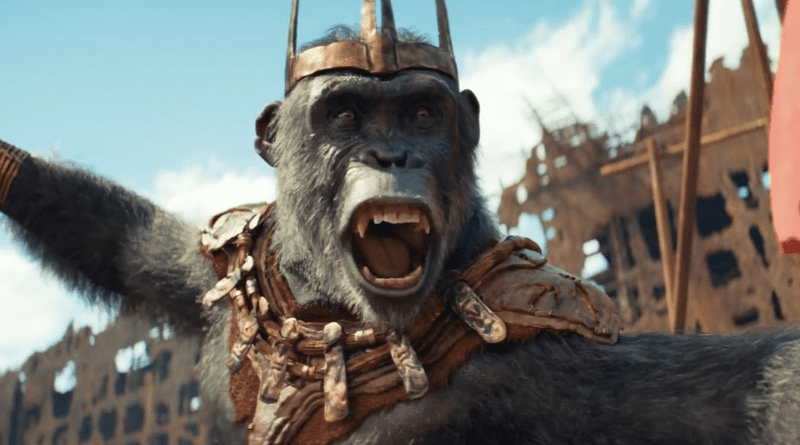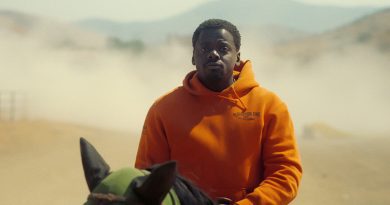Kingdom of the Planet of the Apes (2024) Review: A Visually Spectacular Standalone Sequel
The last time we had a Planet of the Apes movie resulting from the surprisingly underwhelming War for the Planet of the Apes in 2017. It did well both critically and financially but personally, apart from its breathtaking visuals and incredibly lifelike CGI and Andy Serkis’s soulful motion-capture performance as Caesar, the movie deflates with drab and sluggish storytelling.
So, the arrival of the Kingdom of the Planet of the Apes seven years later barely excites me initially. Not especially having Wes Ball on board, who previously directed the erratic Maze Runner trilogy, exactly inspires confidence. He doesn’t strike me as the first choice in my mind to take over the Planet of the Apes reboot franchise from Rupert Wyatt (2011’s Rise of the Planet of the Apes) and Matt Reeves, where the latter directed the last two instalments. But as it turns out, Ball proves to be a worthy successor after all and whatever doubt I have about him is immediately cast aside after I finally watched the movie.
In Kingdom of the Planet of the Apes, this standalone sequel takes place “many generations later” after the events of War for the Planet of the Apes. We are now introduced to a trio of young apes — best friends Noa (Owen Teague), Soona (Lydia Peckham) and Anaya (Travis Jeffery) as they live peacefully in a close-knit community of the Eagle Clan. The clan in question refers to the apes led by Noa’s father Koro (Neil Sandilands) a.k.a. Master of Birds who take care of the eagles. These birds have mutual bonds with the apes and here, we learn these young apes are required to search for an eagle egg each for a bonding ritual.
The movie gets off to a promising start with a majestically shot opening scene of Noa and his two best friends scaling the forest mountains to look for an eagle egg from a nest. The special effects and lifelike motion-capture work of the apes are top-notch as everything blends seamlessly together. Ball’s flair for propulsive action and dynamic camerawork with the help of Gyula Pados reminiscent of a video game cutscene is visually spectacular. The opening scene alone proves that Ball has what it takes to handle a big-budget Hollywood blockbuster, which reportedly cost US$160 million.

Soon, the Eagle Clan’s peaceful existence is disrupted by the arrival of a hostile ape clan. They raid the village and set it on fire before capturing the Eagle Clan’s helpless apes. Now, it’s up to Noa to save his clan and family. This marks a long journey as Noa meets an intellectual, hermit-like orangutan Raka (Peter Macon) and a mysterious human girl (Freya Allan). The three made their way to the place where Proximus Caesar (Kevin Durand) ruled the ape kingdom and twisted the deceased Caesar’s (Andy Serkis, who previously played the iconic role in the trilogy) ideology.
Kingdom of the Planet of the Apes may lack the acting prowess and solid character arc of Andy Serkis’s Caesar as Owen Teague’s Noa’s coming-of-age journey isn’t as compelling as I thought. Still, Teague’s motion-capture performance does have his moments. Kevin Durand’s main antagonist role as Proximus Caesar is a classic iron-fisted ruler, complete with scenery-chewing acting style. Peter Macon, in the meantime, steals the show in his memorable supporting turn as Raka with a well-placed comic relief and affable personality.
Josh Friedman’s (2005’s War of the Worlds) screenplay effectively incorporates a sense of adventure and mystery, where the latter focuses on Proximus Caesar ordering his troops to capture Freya Allan’s character for a reason that doesn’t disclose the details. Using breadcrumbs-style storytelling, it keeps one intrigued and wondering why Proximus Caesar wants her so badly.
I was initially worried about the movie’s 145-minute length, earning the franchise a first for being the longest entry in the 56-year-old franchise since the 1968 original. But thankfully, the movie doesn’t overstay its welcome with a deliberate, yet confident pace and Ball knows when to push the right button. This is especially true with the rousing climactic third act and before that, a suspenseful and thrilling set-piece taking place in a field of tall grass. As with the tradition of the Planet of the Apes movie, the story explores thematic subject matters that ask questions about the fear of dominance between the apes and humans through the power of knowledge and technology.





